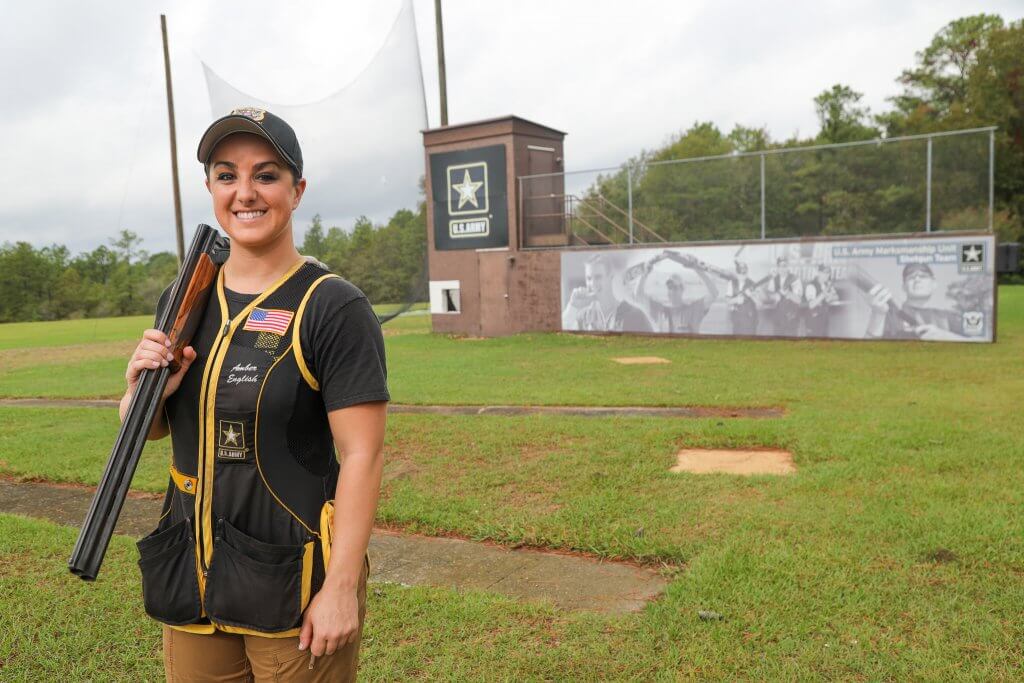Like many Olympic hopefuls, Army Reserve 1st Lt. Amber English, a skeet shooter, has dealt with a variety of interruptions and delays due to the pandemic. And, like many soldiers, she has a resilient nature and ability to adapt and overcome.
English, a Team USA member, has been preparing for years for the challenges of Tokyo 2021.
“It’s been a long time coming. They say, generally, to build an Olympic athlete from start to finish is around 10 years,” English said.
She is in her second go-around on an Olympic team. The first time wasn’t ideal.
2016 Olympics
“I was geared up to make the ’16 team and then had some hurdles to get through,” she said.
English unexpectedly lost her father, Mike, during the 2016 Olympic trials. She ended up as an alternate and took some time off.
English grew up in Colorado Springs, Colorado. Her father trained as a member of the U.S. Running Target National Team at the United States Olympic Training Center in Colorado Springs.
Skeet shooter
Her athletic career began with gymnastics, but by the end of high school the sport had taken a toll on her, and the Olympian gravitated toward becoming a skeet shooter. The timing was perfect. USA Shooting needed more women and junior girls for the shotgun event, English said. She had tried rifle and pistol but wasn’t feeling it.
“And so I went out to the shotgun range there right at Fort Carson — the Olympic Training Center range — and after that day, like, I was hooked,” she said.
READ MORE: Army’s World Class Athlete Program prepares soldiers for Tokyo Olympics
Joining the military
After joining the military in 2017 as a logistics officer, English became a part of the Army Marksmanship Unit at Fort Benning, Georgia, which has been crucial to her quest for Tokyo gold — the goal for 2021.
“I know I’m capable of it,” she said. “And I’m surrounded by enough people to have that support to go get it done. They’ve pushed me daily to be in that environment.”
English practices five to seven days per week from dawn to 4:30 p.m. under all conditions (except lightning). There are two styles of skeet shooting, she said, International and American. She shoots International. The International style moves faster, and competitors use 12-gauge over and under shotguns. English’s gun is a custom-fit, Italian-made Perazzi.
International competitions comprise shooting 125 targets in a course of fire during two days, as opposed to the American style, which consists of 500 targets and the use of different shotgun gauges, she said.
According to the NRA, the International style is much more demanding than American. International targets move quicker and farther, and the gunstock’s position is below the waist.
Training strategy
Part of English’s training strategy is to create discomfort at home while training “so that when you go overseas, and you go to these big matches, and you’re uncomfortable, you’re like, ‘Oh, well, I’ve already been here a hundred times so, here we are, we’re gonna do it.’”
It can be difficult to simulate stressful, high-pressure situations in a non-competitive environment, she said, but the group of skeet shooters she trains with challenge one another to meet designated practice goals. English also dispenses self-imposed sanctions if immediate training outcomes aren’t successful.
“I know I’ve struggled with certain parts of the match, and I said, if I don’t shoot a certain score, my punishment is I have to put my gun away for the rest of the day, and I can sit at home and have to think about how to work through this problem without training,” she said.
Performing under pressure
The Army has taught English how to perform under pressure. Shooting necessitates a calm demeanor and firm control over fine motor skills while competing. Then couple those factors with the pressure, and the margin of error increases.
“One of the things I’ve learned since joining the military is that these people that I’m surrounded by, whether they’re shooting or whether deployed, whatever their job is in the military, they still have to figure out how to get the job done,” she said. “You just have to let yourself do the right thing at the right time. You have the tools. Just knowing that you’ve prepared for it and done so much.”

